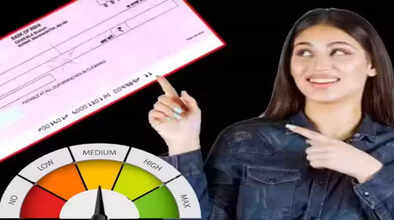Does a Cheque Bounce really spoil your Cibil Score? Half-truth or complete lie! Understand here

A normal cheque bounce is not directly the villain of your CIBIL score, but its indirect effect is seen on your CIBIL score. Know here when a cheque bounce can drop your CIBIL score and when not. What precautions should you take in this matter?
In today's digital age, even though the use of UPI and net banking has increased, even today cheque is considered a reliable and important means for big transactions, business deals and paying loan EMIs. But many times the cheque bounces due to reasons like insufficient balance in the account or mismatch of signature. Some people believe that if the cheque bounces repeatedly, it spoils your CIBIL score. Is this really true? Is a bounced cheque really the enemy of your CIBIL score? Understand here-
First of all, understand what is CIBIL score?
The CIBIL score, also known as credit score in common language, is a mirror of your financial credibility. It is a 3-digit number, which ranges between 300 to 900. The closer your score is to 900, the stronger your financial profile will be considered. A bank or any financial institution checks your CIBIL score before giving you a loan or credit card. This score is decided according to your loan repayment habit, credit card bill payment history, etc.
Now know whether check bounce spoils CIBIL?
The simple and straight answer is- the incident of check bouncing does not directly affect your CIBIL score. It is important to understand the reason for this. CIBIL (or other credit bureaus like Experian, Equifax) track your credit history only when a bank or financial institution sends them the data.
When you give a check to a person, friend or a shopkeeper and it bounces, then this transaction is between you and that person. The bank can impose a penalty on it, but it does not send the information of this individual transaction to CIBIL. CIBIL is not concerned with every single check transaction of yours.
So where is the danger then?
The real twist in the story comes when the check bounce is related to a credit i.e. debt. Here check bouncing can badly affect your CIBIL score. Let us understand this through some situations:
Situation 1: Loan EMI or credit card bill
This is the most common and dangerous situation. Suppose, you gave a cheque to the bank to pay your car loan EMI or credit card bill. If the cheque bounces due to low balance in your account, then in the eyes of the bank, you have not paid your EMI or bill on time.
What happens: Will the bank consider this as a 'payment missed' or 'default'?
The bank will directly report this 'payment default' to CIBIL. CIBIL does not care how the payment failed, for them it is a 'due date missed'. This will be recorded as a negative entry in your credit report and your CIBIL score can fall by 50 to 70 points or even more.
Scenario 2: Your relationship with the bank deteriorates
If your cheques bounce repeatedly, even if they are for personal transactions, then your bank may see you as an irresponsible customer.
What happens: The bank may start keeping a close watch on your account?
In the future, when you apply for a personal loan, home loan or credit card from the same bank, the chances of your application getting rejected will increase. The bank will hesitate to give you a loan in view of your poor 'financial discipline'. This does not directly affect CIBIL, but it affects your ability to take a loan.
Situation 3: Legal action
If the amount of the cheque bounce is large, then the person to whom you gave the cheque can take legal action against you under 'Section 138 of the Negotiable Instruments Act, 1881'.
What happens: This can become a criminal case, in which you can be fined and jailed.
Effect: If the case goes to court and the verdict comes against you, then it becomes a blot on your financial record. This legal matter can become a hindrance in your way while taking a loan in the future.
Frequently Asked Questions (FAQs)
Q1. My personal cheque has bounced, will my CIBIL score fall?
No, bouncing of a personal cheque given to a friend or shopkeeper does not directly affect your CIBIL score.
Q2. How much can the CIBIL score drop if a loan EMI cheque bounces?
This depends on many factors, but generally, if an EMI cheque bounces, your score can drop by 50 to 70 points or even more.
Q3. What legal action can be taken if the cheque bounces?
The person receiving the cheque can send a legal notice against you under section 138 of the Negotiable Instruments Act and the matter can go to court, which can result in a jail term of up to 2 years or a fine of double the amount of the cheque.
Q4. What to do if the cheque bounces by mistake?
Immediately contact the person or bank to whom you gave the cheque. Pay the bank's penalty and complete the payment through another medium (cash, UPI, NEFT) as soon as possible so that the bank does not report it to CIBIL or there is minimal impact.
Q5. How can I check my CIBIL score?
You can check your CIBIL score and report for free or by paying a nominal fee by visiting the official website of CIBIL or the apps or websites of many other financial service providers.

